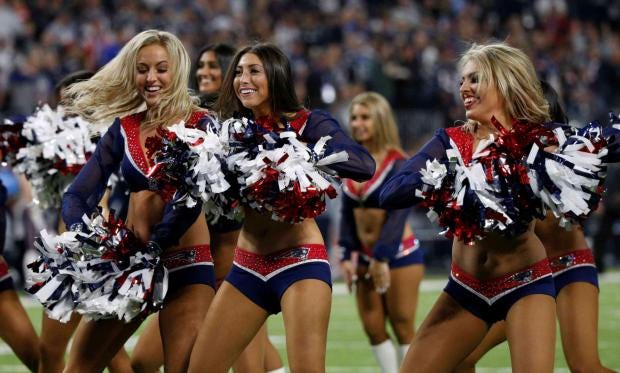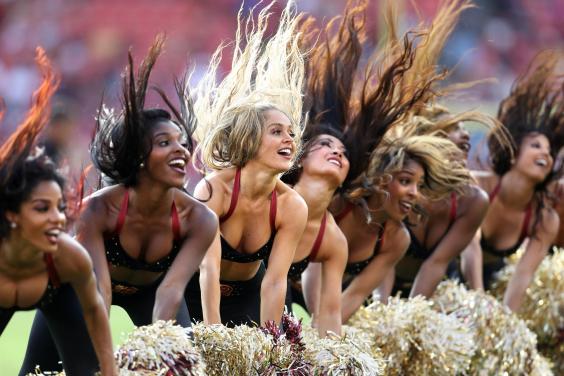
Few things are odder to me than American Football. For the roughly three hours you are expected to watch, you’ll get one hour when anything is actually happening. Unless it’s the cheerleaders on the sidelines you’re interested in, but even then you have to be pretty close to the field to appreciate their routines, otherwise they're little more than sparkly specks in the distance.
There is a teen-comedy flick I’m told I should watch (or definitely not watch) called Bring It On, with Kirsten Dunst and Gabrielle Union, but generally speaking I haven’t spent much time pondering the culture of cheerleading. Until now. Suddenly, in the age of #MeToo and Time’s Up, it is under fire, threatened with possible extinction even.
First an apology to fans of cheerleading. I had never really thought of it as a sport in its own right, requiring gruelling hours of training and serious athletic ability. Nor did I know how insanely competitive it is. Young women hoping one day to be accepted onto the cheerleading squad of a major National Football League, NFL, franchise better be ready to be disappointed.
This isn’t all, however. With the rest of the country, I have also been learning of how things can turn out for those who do make it to the big-league teams, say the Dallas Cowboys or the Baltimore Ravens. In short, not great. A flurry of media exposes as well as some legal suits have revealed the seamier, sadder side of the life they have strived so hard to be accepted into. A life of exploitation. Of being objectified.
We shouldn’t be surprised. The media reports and as well as details contained in the lawsuits filed by two members of the cheerleading teams of the New Orleans Saints and the Miami Dolphins have confirmed that it’s not female athleticism that team owners are most interested in when they kit these women out with skimpy outfits and pompoms and send them out to dance. It’s sexual allure.
The Washington Redskins (they still haven’t dropped the name) were accused in a New York Times expose of shipping members of its cheerleading squad to an all-adult resort in Costa Rica to participate in a calendar photo shoot only to be asked once there to go topless even though no nudity was required for the calendar itself. It turned out some male corporate sponsor types had been invited along and would be watching while the photographers and the women worked. Some cheerleaders were also asked to accompany the men to a night club later.
Elsewhere, current and former NFL cheerleaders have spoken out about duties conferred on them that would appear entirely inconsistent with the innocent wholesomeness they are constantly asked to project. They speak of being groped and mauled when ordered out to pep up male fans in sky boxes at stadiums and even at pre-game ‘tailgate’ parties in parking lots. They have spoken of being bombarded by verbal vulgarities too. One cheerleader told the Times of fans of an opposing team saying he hoped she got raped.
“When you have on a push-up bra and a fringed skirt, it can sometimes, unfortunately, feel like it comes with the territory,” Labriah Lee Holt, a former cheerleader for the Tennessee Titans, told the Times. “You have to run around the tailgates, go to the tents, mingle with fans and shake the pompoms. And you sometimes get the disgusting old men who have been drinking and will say something inappropriate. It is common, and the industry knows that.”
Handsy and abusive fans are one thing. But the focus here are team managements, their failure to protect the cheerleaders and the climate of fear they create for them. Fear of being fired for putting on a few pounds for example, (there are regular weigh-ins and so-called ‘jiggle tests’), or for behaving in ways unbecoming even when the business of cheerleading stopped being becoming a long time ago.
In her lawsuit, Bailey Davis claims she was fired as a Saint-sation – that’s what cheerleaders at the New Orleans Saints must go by – after being accused of attending a social event at which one of the team players was present, which is strictly forbidden, and posting a racy picture of herself on her own social media account. She was not topless in the image. The entirely different rules for the players and the cheerleaders amount to gender discrimination, the suit says. And by the way, some players get paid millions, while cheerleaders generally get little more than the minimum wage for the ‘honour’ of being the players’ smiling ambassadors.
Among the stranger requirements revealed by Davis: she could enter the stadium at game time only once she’d sold a required number of team calendars outside. She couldn’t interact in any way with Saints players, even on social media. If a player entered a restaurant she was eating at, she was required to leave. Players face no reciprocal restrictions, however.
In her action, Kristan Ann Ware accuses the Dolphins of creating an atmosphere of ridicule because she was unabashed about her Christianity and desire to remain a virgin until marriage. She became, the suit said, “a target of discipline, ridicule, harassment and abuse”.
What to do here? Surprise fans by rotating out the women and having all-male cheerleading squads on the field for at least half their games, dressed not in short, fringed skirts but short, fringed shorts? Actually, a first step in that direction has already been taken by the Los Angeles Rams. Two men have just been hired to dance alongside the female cheerleaders starting next season.
Some are advocating ending cheerleading in the professional leagues altogether as an offensive throwback to less civilised (pre-Harvey Weinstein) times. Not going to happen, obviously. There are some things in a country’s culture you can’t strip away willy-nilly. Britain tried it with fox hunting and, well, it didn’t work really, did it? But it isn’t too much to expect the franchises to grow up and treat these women with the respect and dignity they expect. And have worked so hard for.








